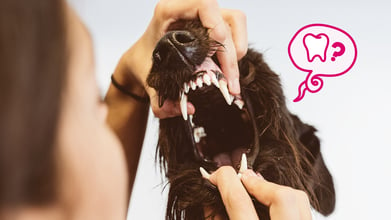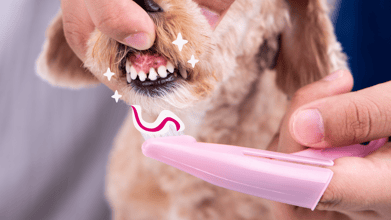A Vet’s Guide to Pet Dental Hygiene & Care

Hey, pet parents! Dr. Kingsley here with BetterVet. Let's discuss something often overlooked but incredibly important for your pet's health: dental hygiene.
How many of you brush your dog's teeth? I'm guessing it's not a huge crowd. That's understandable. It's not the most glamorous task, and it can be challenging, especially if your furry friend isn't thrilled about the idea.
But trust me, it's worth the effort.
🔑 Key Takeaways:
- Early dental care can help prevent painful dental diseases and costly procedures later on.
- Neglecting your pet's dental hygiene can lead to serious health issues, including heart, liver, and kidney problems.
- Regular brushing and professional cleanings are vital for optimal oral health.
- Be aware of bad breath, dropped food, pawing at the mouth, and avoiding chewing as potential indicators of dental issues.
Why is Pet Dental Care So Important?
Like humans, pets can develop dental problems, leading to serious health issues. We're not just talking about bad breath but also gum disease, which can spread to the heart, liver, and kidneys. Yikes!
Also, once your pet develops tartar, your cat or dog may experience dental pain associated with the inflammation, which we want to avoid.
Pet Dental Care Pop Quiz
1. Adult dogs have 32 teeth.
2. Adult cats have 30 teeth.
3. Your pet should have all of their teeth in by the time they are 3-4 months old.
4. It’s safe to use human-grade toothpaste with your pet.
5. Heart disease is the most common disease in pets.
6. The smaller the dog, the more susceptible they are to developing dental problems.
7. Your pet should have a professional dental cleaning at least once per year.
8. If I brush my pet’s teeth at home, they don’t need a professional dental cleaning.
View Results
Pet Dental Care Pop Quiz
1. Adult dogs have 32 teeth.
2. Adult cats have 30 teeth.
3. Your pet should have all of their teeth in by the time they are 3-4 months old.
4. It’s safe to use human-grade toothpaste with your pet.
5. Heart disease is the most common disease in pets.
6. The smaller the dog, the more susceptible they are to developing dental problems.
7. Your pet should have a professional dental cleaning at least once per year.
8. If I brush my pet’s teeth at home, they don’t need a professional dental cleaning.
Share Quiz
About Pet Dental Disease
Dental disease can crop up as early as two or three years old, depending on lifestyle and breed. So getting your pet used to toothbrushing when they are young is an absolute priority.
Dental care for our older patients is also extremely important. If they have decay or infection inside their mouth, it can make any existing health conditions worse.
Signs of Dental Problems
How do you know if your pet has dental problems? Bad breath is a common sign and is caused by the buildup of bacteria, which can have serious effects in the long term.
Plus, let's face it: no one wants to kiss a pet with stinky breath!
In addition to offensive breath, there are other signs of toothaches to watch out for, too:
-
Dropping food or pieces of kibble
-
Avoiding chewing on one side of the mouth
-
Pawing at the mouth
If you notice these signs, it's time to see your vet.
Pet Dental Health Quiz
1. How often do you brush your pet’s teeth at home?
2. What color are your pet’s teeth?
3. When you look at your pet’s gums, which best describes what you see?
4. When you check your pet’s teeth, what do you see?
5. How does your pet respond to having their teeth or mouth touched?
6. When my pet eats, they:
7. When you kiss your pet you notice…
View Results
Getting Started with Brushing
So, how do you get your pet to tolerate brushing? Patience is the key.
Brushing your pet’s teeth does take some time. I recommend getting in the habit of brushing your pet’s teeth every day if possible, but if not, then at least a few times per week.
Here are a few tips to get you started:
-
Introduce your kitten or puppy to tooth brushing early.
-
Start by gently introducing a soft toothbrush or finger brush - you can purchase these on Amazon or PetSmart.
-
Let them sniff it, and even give them a small treat while they're checking it out.
-
Gradually work up to lifting up their lip and touching their teeth with the brush.
-
Continue to work up to more extended periods of brushing until it reaches a therapeutic level (30-60 seconds).
-
Positive reinforcement is essential here. Lots of praise and treats!
Remember, it's going to take time. Don't get discouraged if your pet is resistant at first. Consistency is the name of the game. Small victories are still victories!
Beyond Brushing
Brushing is essential, but it's not the only thing you can do to keep your pet's teeth healthy. There are plenty of products out there to help, from dental chews to water additives to special diets.
However, it's important to choose products that are going to work. Talk to your veterinarian about what options are best for your pet.
Regular professional cleanings are crucial, even if you're diligent about brushing at home. These cleanings allow us to get a good look at your pet's oral health and address any underlying issues.
Veterinary Teeth Cleaning
Even if your pet is already showing signs of decay, tartar, or dental disease, it’s not too late to get on top of their oral health care.
A veterinary cleaning is the best thing you can do to reverse any dental disease that is already present. Under anesthesia, pets have their teeth completely cleaned and polished.
We also complete full dental X-rays, just like you and I would get, to make sure there aren't any surprises underneath the gum line that need to be addressed.
Extractions might be warranted, and once we fix the problem and everything heals, they actually feel much, much better.
Once the dental disease is treated, you can start a brushing regimen to prevent further damage or extractions.
Anesthetic vs. Non-Anesthetic Dental Cleanings
You might have heard about non-anesthetic dental cleanings. While these can be helpful for some pets, they're less thorough than a professional cleaning done under anesthesia. For pets with advanced dental disease, anesthesia is often necessary to clean and treat the teeth properly.
Don't Let Pet Dental Disease Sneak Up on Your Furry Friend
Regular checkups are crucial for maintaining your pet’s overall health and well-being. Our stress-free in-home visits make it easy to ensure your pet's oral health is always in top condition.
Conclusion
Taking care of your dog’s or cat’s dental health might seem like a chore, but it's essential to keeping them happy and healthy. With a little patience and consistency, you can help prevent dental problems and enjoy many more happy years with your furry friend.







